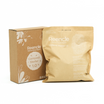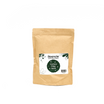How to Create Odor-Free Compost Piles

Composting is a rewarding practice.
It enriches the soil, reduces waste, and promotes a sustainable lifestyle. However, a common concern is the compost smell.
Does your compost pile or bin emit an unpleasant odor? Are you worried about how bad a compost toilet might smell?
You're not alone.
Many people share these concerns.In this guide, we'll explore how to create and maintain odor-free compost piles.
We'll delve into the science of composting, balance of ingredients, and practical tips to control odors.Whether you're a seasoned gardener or a composting novice, this article will equip you with the knowledge to manage compost smells effectively.Let's embark on this journey towards efficient, hygienic, and odor-free composting.

Why does our partnership matters
For every purchase, we plant 1 TREE to nurture our planet 🌲Together, we are sowing the seeds of change and cultivating a greener, more sustainable world.
Anything else?
Anything else?You willl also receive an official certificate from Greenspark as a token of appreciation for your commitment to the environment! 📜
How do we see the progress?
How do we see the progress?Join us on this remarkable journey towards an impact dashboard.You can see how your eco-smart choice made the world a better place
 View more
View more
Your support empowers reforestation, fights climate change,
and paves the way for a brighter, eco-friendly future.
Join us on this remarkable journey towards a cleaner,healthier planet.
Shop with a purpose, shop with Reencle! 🛒💚
Understanding Compost Odors
Compost odors are often a sign of imbalance. They indicate that something in your compost pile isn't quite right.
The smell can be due to various factors. These include an excess of wet, green materials, lack of aeration, or the presence of non-compostable items. Understanding these factors is the first step towards managing compost smells.
The Science of Composting
Composting is a natural process. It involves the breakdown of organic matter by microorganisms, worms, and other decomposers. This process is essential for recycling nutrients and creating rich soil.
However, when conditions in the compost pile are not optimal, the process can produce unpleasant odors. This is often due to anaerobic conditions, where the lack of oxygen leads to the production of smelly gases.
Balancing Your Compost Ingredients
A well-balanced compost pile is key to preventing bad smells. This balance is achieved by mixing the right amounts of green and brown materials.
Green materials are rich in nitrogen. They include kitchen scraps like fruit and vegetable peels, coffee grounds, and fresh grass clippings.
Brown materials, on the other hand, are carbon-rich. They include dry leaves, straw, paper, and wood chips.
Here are some tips for balancing your compost ingredients:Aim for a ratio of 1 part green to 3 parts brown.Mix the materials well to ensure even decomposition.Add new materials in layers to maintain balance.
Green vs. Brown MaterialsGreen materials provide the nitrogen needed for microorganisms to grow and reproduce. They are typically moist and decompose quickly.Brown materials, in contrast, provide carbon. This is the energy source for the microorganisms. These materials are usually dry and decompose more slowly.
Oxygenation and Aeration Techniques
Oxygen is vital for the composting process. It supports the aerobic bacteria that break down organic matter. Without enough oxygen, the compost pile can turn anaerobic, leading to unpleasant smells
.Aeration techniques can help maintain oxygen levels in your compost pile. These include turning the compost, adding bulky materials, and creating air channels.Remember, a well-aerated compost pile not only smells better but also decomposes faster.
Moisture Control in Compost Piles
Proper moisture control is crucial in maintaining an odor-free compost pile. Too much moisture can create anaerobic conditions, leading to a foul smell.
On the other hand, too little moisture can slow down the composting process.Striking the right balance is key. Your compost pile should feel like a wrung-out sponge, damp but not soaking. Regularly check the moisture level and adjust as needed by adding dry or wet materials.
Troubleshooting Compost Smells
If your compost pile starts to smell, don't panic. It's a common issue that can be fixed with a few adjustments. The first step is to identify the cause of the smell. Often, a compost smell is due to an imbalance in the compost pile. It could be too wet, too dry, or lacking in oxygen. Once you've identified the issue, you can take steps to correct it.
Identifying and Removing Offenders
Some items should not be composted as they can cause bad smells. These include meat, dairy, and pet waste. If you find any of these in your compost pile, remove them immediately.Also, be aware of any materials that are slow to decompose. These can create a backlog in your compost pile, leading to smells. If necessary, remove these items and compost them separately.
Compost Pile Size and Location
The size and location of your compost pile can also affect its smell. A pile that's too large may not get enough oxygen, leading to bad odors. Aim for a pile that's about 3 feet high and wide.
Location matters too. Place your compost pile in a well-ventilated area, away from your home and neighbors. This will help disperse any potential odors and keep them from becoming a nuisance.
Advanced Tips for Odor Control
Beyond the basics, there are advanced techniques to further control compost smell. One such method is the use of compost additives like lime or sawdust. These can help balance the pH level and absorb excess moisture, reducing odors.
Temperature and seasonal changes can also affect compost odor. Adjust your composting practices according to the weather. For instance, turn your compost more frequently in hot weather to prevent it from becoming anaerobic and smelly.
Finally, consider using compost tumblers. These enclosed systems can provide better odor management than traditional compost piles.
Conclusion: The Rewards of Odor-Free Composting
Creating an odor-free compost pile is not just about avoiding unpleasant smells. It's about ensuring the composting process is efficient, hygienic, and environmentally friendly. By managing odors, you're promoting a more successful composting practice.
Remember, composting is a commitment to a sustainable lifestyle. It's about reducing waste, enriching soil, and contributing to a healthier planet. So, keep learning, keep experimenting, and enjoy the rewards of your odor-free composting journey.











